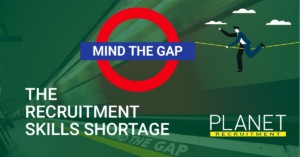Meet Alex Walker, IT Recruitment Division Manager

Today we meet Alex, the leader of our IT Recruitment Division.
You could probably call Alex Walker one of the Planet OG’s. He was full-time employee no.5, set up the IT Recruitment desk and has helped shape the business ever since.
But what makes him tick? What is he proud of? And as one of the Recruitment Old Dogs, what advice does he have for the latest generation of wannabe recruitment superstars?
Tell us about yourself and how you got to here?
You probably guessed from the title, my name is Alex and I manage the IT Division here at Planet Recruitment.
Before I entered the world of recruitment, I had quite a varied history. I travelled the world, worked in telesales in Australia, and managed several restaurants and hotels – including a well-known restaurant in the Cotswolds.
I got my first recruitment job over 25 years ago, most of that time focusing on IT. It all began in London, which was a very fun time, but it continued for me in Bristol, Birmingham, and then Oxfordshire, where I ran my own consultancy for 5 years before I started my amazing family.
4 years ago, right in the middle of the pandemic, I joined a small Recruitment start-up called Planet and established the IT division. Today, 4 of us focus on IT, part of a wider team of over 20.
What are you good at?
Understanding people. That’s really the key to doing the job well. Obviously, I have quite detailed, personal conversations with candidates and clients, but it’s reading between the lines where the magic happens. A job description will give you the highlights of a role, but speaking with the line manager, the director, the person in need of extra resource is where you really understand where they need help.
It’s a similar story to getting candidates to open up. Everyone will tell you that they are looking for a certain salary, a certain level of flexibility, responsibility and reward – however from a CV, you cannot get into why they really left their last role, their aims for the future, what is happening outside work that is their real motivation for advancing their career.
Once you get to understand all motivations from all sides, then you can match the right people.
I also consider myself good at building a high-performing team, something that we’re particularly strong at across the whole business. Many of the team came onboard as first-timers, resources or junior recruiters. Now they are among the high performers across the business.

Who do you like working with?
The short answer – a business or IT leader who needs our specialist advice.
I love getting embedded within a business or IT department. We have many clients who we have recruited most, if not all, of their team. Often before we are even briefed on a role, we know exactly what they are looking for.
When thinking about candidates – I like helping them all, if I’m honest, but those who need the help are the most rewarding. People who feel stuck in their roles might not like interviewing, are a little scared of the whole recruitment process and simply scroll job boards, frightened of rejection. They probably need the most help. Like what I said above about reading between the lines. My team & I meet every single candidate to match their needs to help find them a role they are suited for, one they are going to wake up every morning looking forward to.
When you joined Planet, did you come across anything that surprised you?
I joined in between the two national COVID lockdowns so it was a strange time to start any job. There were only 5 of us in the business then. The two owners and us sitting around two desks in a small room.
Pretty quickly, we went back to work from home but seeing where Planet is now from where it was then, is amazing, but not a surprise. It’s impressive and a testament to the hard work that all 20+ of us have put in since.
What’s your favourite Planet memory?
Coasteering. Without a doubt.
Did I ever think I would want to jump off cliffs into the sea? NEVER! That day I managed to do something I never thought I would, surrounded by the support of the team, Gavin Jones in particular.
After that I felt like I could do anything!

What are you particularly proud of?
The team especially. Seeing certain people progress in their career and personally has been very rewarding.
Also to see how Planet Recruitment has grown as a whole. Being part of that journey like I have. The company is still young and I have seen first hand the process in such a short time. I love being around the directors and owners of the business, learning from working side-by-side.
Being a local business too, it’s refreshing to see the togetherness success and teamwork, knowing it all came from scratch within Oxford. It’s so different to the large corporates I have worked with in the past.
What advice do you have for upcoming recruiters or anyone thinking of joining the industry?
Modern recruiters are trained wrong from the start. I cringe at the lack of quality, lack of care, the sales-heavy focus that seems to be the standardised thing. There’s no passion.
Yes, recruitment is fast-paced, but people are concentrating too short term, and no longer sharing the hiring experience with candidates and their clients.
I particularly don’t like what recruitment has become on LinkedIn. Everyone appears the same, talking more about themselves than anything else.
Try to take your time. Yes, you have short-term targets but quick-wins will not help you achieve your long-term goals. Be genuine. Take time to build relationships and your clients will come back time after time. That’s how the most successful recruiters stay successful.








Challenges and Opportunities Facing IT Graduates

The recruitment world frequently engages in discussions about the challenges and opportunities facing IT graduates, given the persistent demand for skilled professionals in the Information Technology sector.
However, despite the growing number of IT graduates entering the workforce, many of them seem to experience stressful times, especially when transitioning from academia to the professional world of work, according to some sources.
In this blog, we explore the cultural shifts, skills gaps and strategies that can empower young graduates to thrive in the IT industry and help businesses leverage the graduate talent pool.
Navigating the Cultural Shift: Transitioning from Campus to the IT Industry.
Recent surveys show that University grads often find themselves feeling “exhausted,” “lost,” and “anxious” as they step into the workforce. Contrary to popular belief, these struggles are not solely generational but cultural. The shift from education to the professional world involves three critical dimensions: Feedback, Relationships and Accountability.
Empowering IT Graduates: The Crucial Role of Feedback
In academia, feedback is an integral part of the academic program and fundamental to the successful completion of the course. Frequent and structured feedback is usually initiated and led by educators to address areas of concern and move forward.
In the workplace, it becomes more sporadic and nuanced. Graduates must adapt to receiving constructive criticism and learn to use it for growth. Especially IT Graduates should take ownership of their learning and development progress, actively seeking opportunities to demonstrate the application of the feedback in practice. This approach is often overlooked and underestimated but helps form positive relationships in the workplace that are fundamental to success.
Meaningful Connections: Building Relationships as IT Graduates
As previously mentioned, building professional relationships is essential. Networking, mentoring, and collaboration are vital skills in the early stages, especially in highly technical fields such as IT. IT Graduates should embrace opportunities and connect with colleagues, managers and industry professionals. One way to address this could be through community or work-based projects, showing enthusiasm and showcasing aptitude and accountability. This is critically important when you try to establish yourself in a professional environment.
Accountability And Personal Development
The transition from a structured academic environment to a more autonomous work setting can be daunting. Graduates must take ownership of their tasks, meet deadlines, and demonstrate reliability. This often goes together with a skill gap assessment and making a provision for ongoing learning. While degrees provide foundational knowledge, the rapidly changing technical landscape necessitates continuous learning. Employers seek candidates with relevant skills, regardless of their educational background.

Opportunities and Adaptability
This shows the importance of seeking further training and investing in personal development. In doing so, graduates demonstrate adaptability and suitability especially when choosing a career in an ever-evolving field such as IT and Engineering.
Perhaps the best advice, naturally, is to stay curious, explore emerging technologies, and seek professional development opportunities.
Some examples of areas of further development for IT graduates include:
Programming: Proficiency in programming languages (Python, Java, C++) is crucial. Graduates should work on real-world projects to hone their coding skills.
Cloud Computing: Cloud platforms (AWS, Azure, Google Cloud) are integral to modern IT. Familiarity with cloud services and deployment is advantageous.
Cybersecurity: Protecting digital assets is paramount. Basic knowledge of cybersecurity principles and practices is valuable.
Conclusion
To summarise, entering the workforce can be daunting, but with the right mindset and continuous learning, recent graduates can thrive. Smart companies should foster a supportive culture, and young employees should invest time and effort in mastering the necessary skills. The journey from campus to cubicle is a transformative one, and graduates have the opportunity to shape their own success stories.
If you are looking for an employment opportunity in the IT and Engineering field, reach out to our friendly team at Planet Recruitment. Start your new journey with us.
Read more about The Recruitment Skills Shortage..



















